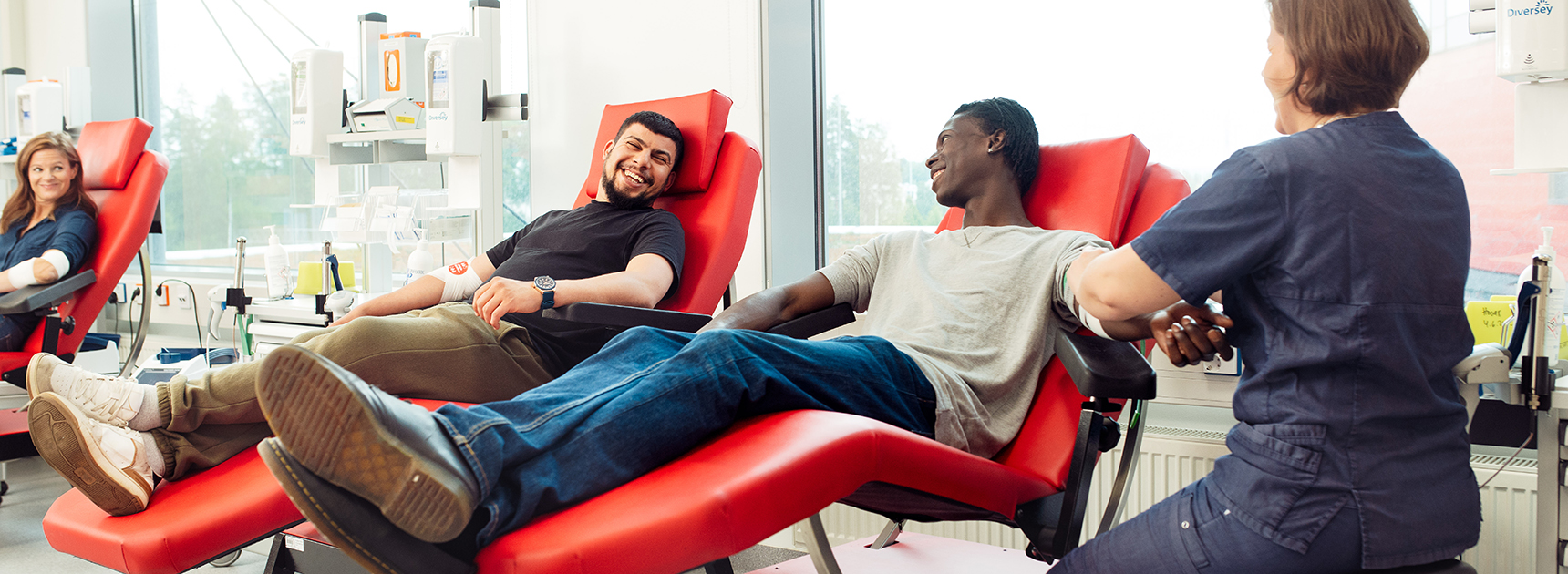Why is blood donation important?

Donating blood is an easy way to help others
Donated blood is vital for patients who need transfusions due to illness, surgery, accidents, or other emergencies. One blood donation can help up to three patients. The Blood Service is responsible for the entire blood supply in Finland and ensures that blood products are safe and available to those in need. Donating blood is a safe and free way to do good.
In Finland, around 40,000 patients receive blood products each year. By law, blood donation is voluntary and unpaid, which plays a significant role in ensuring the safety of the blood supply.
Who is eligible to donate blood?
Health and well-being: Donors must be healthy and feel well on the day of donation.
Age: Donors must be between 18 and 70 years old. First-time donors must be under 60.
Weight: Donors must weigh at least 50 kg and no more than 200 kg.
Personal identity number: Donors must have a Finnish personal identity number.
Identification: Donors must present an official photo ID, such as a driver’s license or passport.
Residence: Donors must be permanent residents of Finland, another Nordic country, an EU or EFTA country, or the United Kingdom.
Language skills: Donors must be able to complete the health questionnaire in Finnish, Swedish, or English.
Hemoglobin level: Hemoglobin must be at a healthy level (at least 125 g/l for women and 135 g/l for men). Hemoglobin is always measured on site, so you don’t need to know it in advance.
Medication: Only a few medications prevent blood donation. What matters most is the condition being treated.
You can check your eligibility with a quick online test!
10 steps to becoming a blood donor – An easy and quick way to help
1. Test your eligibility to become a blood donor
If you are coming to donate blood for the first time or it has been a while since your last donation, you can take a quick online test to see if you can donate blood.
2. Find the nearest donation site and book a time that suits you
If there is space, we are happy to welcome those who come without an appointment.
3. Fill out the health questionnaire
Fill out the electronic health questionnaire on the day of donation or at the earliest one day before the donation. The health questionnaire ensures the safety of both the donor and the blood recipient.
4. Before donating blood
Eat and drink as usual, but avoid heavy meals just before donating.
5. Registration
When you arrive to donate blood, register using the queue number device or with a nurse. You need a valid ID with a Finnish personal identity code for registration.
6. Health questionnaire review and hemoglobin measurement
The nurse will privately go through your health status. They will measure the hemoglobin level in your blood from your fingertip. If everything is okay, you can proceed to donate! Sometimes donation is not possible, but that’s okay. There are no unnecessary visits!
7. Blood donation takes only about ten minutes and can save someone’s life
At the beginning of each donation, blood samples are also taken for blood group and virus tests. This does not require a separate puncture.
8. Enjoy the refreshments and take the rest of the day easy
We offer free juice, coffee, tea, and snacks to blood donors. Remember to drink more than usual on the donation day and avoid exercise, sauna, and excessive sweating.
9. Encourage others
New blood donors are needed constantly. You can follow us on social media @veripalvelu and share our updates. We are happy if you make a social media post during your blood donation and tag us @veripalvelu.
10. Come Again
Every blood donation makes a difference. We look forward to seeing you again!
How Can You Motivate Others?
Even if you’re not able to donate blood yourself, you can still help patients by encouraging your friends and family to donate—and save lives.
1. Talk about the importance of blood donation
Tell your friends and family why blood donation matters and how it can change lives.
Share information on social media and inspire others to do the same.
2. Organize group donations
Plan a joint blood donation visit with your friends or family—it’s a meaningful and fun way to spend time together while making a difference.
You can also suggest starting a Donation Group at your workplace or hobby club, or encourage your employer to allow blood donation during work hours.
3. Offer support and encouragement
Many people hesitate to donate because they’re unsure what to expect. You can accompany your friend to donate blood for support. We offer coffee and good vibes to both!
Join us and help save lives!